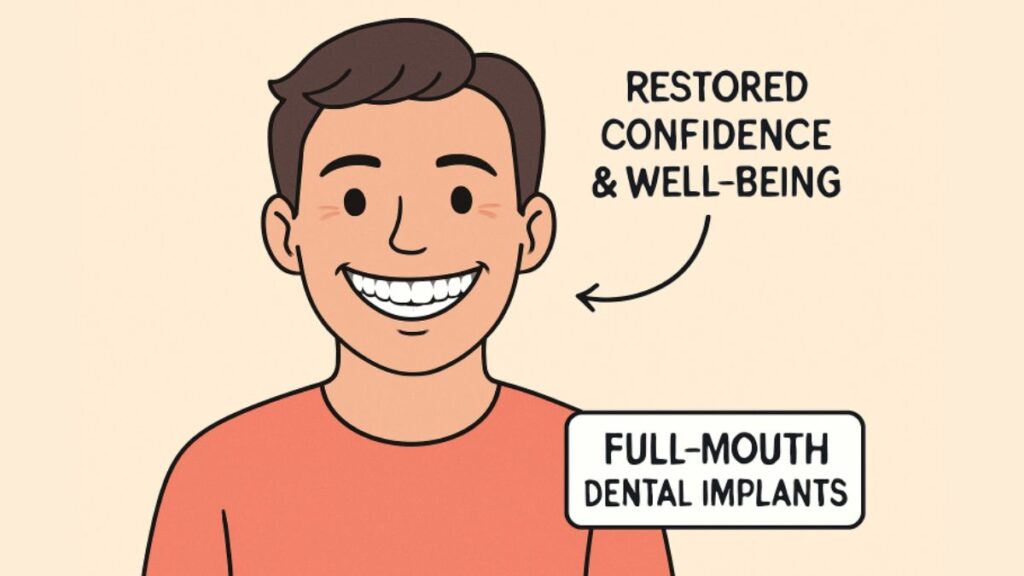Introduction
Living with missing teeth affects not only the appearance of our smiles but also the functionality necessary for daily life, impacting everything from the way we nourish ourselves to our ability to speak clearly. The emotional toll is equally significant, often undermining self-worth and confidence. Full-mouth dental implants present a comprehensive, life-changing solution beyond surface-level improvements for many individuals. They are much more than just a cosmetic fix—they represent a powerful and lasting restoration of self-assurance and health. Anyone seeking a durable, secure, and indistinguishable restoration from natural teeth might find that complete dental implants provide a dramatic upgrade over traditional dentures or bridges.
Modern implant dentistry isn’t just about looking better. Full-mouth dental implants offer a new lease on life by providing reliable stability and comfort in everyday activities such as eating, laughing, and speaking. The transformation is comprehensive: from outward appearance to day-to-day functionality, as well as inner feelings of joy and self-esteem. The impact of this technology allows patients to regain independence in their routines, strengthen their social confidence, and enjoy the foods and conversations that add meaning to life.
Understanding Full-Mouth Dental Implants
Full-mouth dental implants involve strategically placing several titanium screws, or “implants,” into the jawbone. These act as artificial roots, upon which custom-designed prosthetic teeth—often crafted from porcelain or advanced ceramic—are securely attached. Unlike traditional removable dentures, which can slip or become uncomfortable, dental implants are anchored directly to the bone. This integration ensures that the prosthetic teeth function like natural teeth, providing stability, strength, and comfort. These permanent solutions can restore a patient’s ability to bite, chew, and speak as before tooth loss.
This approach is especially advantageous for those who have lost most or all of their teeth, or for denture wearers tired of the inconvenience, instability, and potential embarrassment associated with moving or ill-fitting appliances. Dental implants can also help reduce the risk of future oral health issues by preserving bone and supporting surrounding teeth. The resulting improvements extend to better nutrition, greater comfort, and a noticeable boost in quality of life. Each case is customized, allowing for tailored solutions that fit the unique needs of every patient.
Enhanced Chewing and Nutrition
One of the most significant challenges facing people with multiple missing teeth or conventional dentures is the difficulty in chewing food properly. This diminished capacity can lead to poor digestion, nutritional deficiencies, and limitations on enjoying a diverse diet. Those relying on dentures often avoid healthy foods such as raw vegetables, nuts, or meats, because these items are simply too tough to chew. Over time, the inability to consume these vital foods impacts physical health, energy levels, and overall well-being.
Dental implants restore a strong and stable bite, enabling individuals to eat confidently and comfortably. This allows them to enjoy the full spectrum of nutritious foods, from crunchy apples to juicy steaks, without fear that their teeth will shift or cause pain. Research has demonstrated that recipients of dental implants often regain much of their original chewing power, supporting better digestion and optimal nutrient absorption. In turn, this promotes better energy levels, supports immune function, and helps patients participate more fully in daily life.
Improved Speech and Communication
The challenge of missing teeth extends into how we communicate, sometimes in subtle yet socially impactful ways. Teeth play an essential role in forming clear, accurate speech sounds, and when they are missing—or when dentures are unstable—the result can be slurred, mumbled, or otherwise unclear speech. This can make everyday conversations daunting, and may lead to self-consciousness, hesitancy, or withdrawal from social or professional situations.
With full-mouth dental implants, the secure fit of prosthetic teeth ensures they remain stable during speaking, allowing for natural movement of the lips and tongue. This stability improves pronunciation and enunciation, creating positive ripple effects in social confidence and interaction. People with implants often find themselves more eager to join conversations, attend gatherings, and express themselves without fear of embarrassment or being misunderstood.
Boosted Self-Confidence and Social Engagement
The emotional burden of losing teeth can be far-reaching. Many people report a decrease in self-esteem due to perceived changes in their appearance or limitations in their daily functioning. This often results in avoiding smiles, laughter, or social gatherings out of fear of judgment or embarrassment. Over time, these patterns can lead to isolation and a reduced sense of happiness and fulfillment.
Dental implants address these concerns by restoring a full, healthy, and natural-looking smile. Unlike dentures, which may appear artificial or change position, implants are crafted to blend seamlessly with the patient’s features. Reclaiming to smile confidently and engage without hesitation brings a renewed sense of freedom and belonging. Positive feedback from friends, colleagues, and loved ones can reinforce these feelings, making the dental implants’ psychological and social impact as meaningful as their physical benefits.
Preservation of Jawbone and Facial Structure
Beyond functional and aesthetic benefits, full-mouth dental implants play a key role in maintaining long-term oral health. When natural teeth are lost, the supporting jawbone begins to shrink over time, a process called bone resorption. This occurs because the bone is no longer stimulated by tooth roots during chewing. As bone diminishes, facial features can sag, resulting in a prematurely aged appearance and complications for fitting future dentures.
Dental implants act as artificial tooth roots, delivering the stimulation necessary to preserve bone density and maintain a healthy, youthful facial structure. This process supports ongoing oral health and helps prevent the sunken cheeks and changes in facial contours seen in long-term denture wearers. By protecting bone volume and gum tissue, implants deliver benefits beyond the immediate replacement of missing teeth.
Long-Term Durability and Cost-Effectiveness
While dental implants are recognized for their upfront cost, they should be viewed as a wise, long-term investment in one’s health and happiness. Unlike dentures, which may require ongoing relining, rebasing, or replacement every few years, implants are designed to be a permanent solution. Proper oral hygiene and routine dental checkups can last many decades, often for a lifetime. Over time, this durability results in fewer replacements and repairs, making implants an innovative and cost-effective solution for full-mouth restoration.
The reliability and predictability of full-mouth implants also help reduce inconvenience and frustration. There is no need for messy adhesives or the embarrassment of accidents caused by loose dentures. For those seeking a hassle-free way to enjoy daily life, this reinforces implants’ position as the gold standard in tooth replacement.
Conclusion
Full-mouth dental implants do more than restore lost teeth—they offer a true transformation of both smile and spirit. By improving chewing ability, enabling clear speech, preserving the jawbone, and enhancing confidence, these implants represent the gold standard for those seeking comprehensive, permanent dental restoration. For anyone ready to reclaim both their oral health and life satisfaction, full-mouth dental implants offer an exceptional next step toward lasting happiness and improved self-image.







